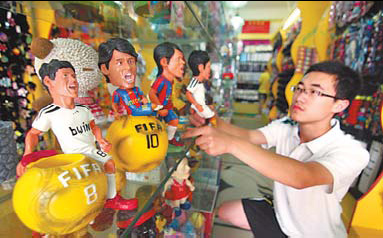Biz Unusual
Jumping on World Cup bandwagon
By Xu Junqian and Yu Ran in Shanghai and Yu Tianyu and Chen Limin in Beijing (China Daily)
Updated: 2010-07-13 14:23
 |
Large Medium Small |
|
 |
|
A shopper selects World Cup-related handicrafts at a store in Zhucheng, Shandong province, last month. [China Daily] |
Harbin Beer, a popular Chinese brand owned by Anheuser-Busch InBev that was made available at venues across South Africa, also increased production levels by 5 to 10 percent to meet demand.
Manufacturing firms in China were perhaps the biggest winners, though.
Domestic firms made about 90 percent of vuvuzelas (colorful horns) on sale at the World Cup, a market worth roughly $20 million, while Zhejiang Dafeng Sports Equipment Co Ltd made the 50,000 seats fitted at the Nelson Mandela Bay Stadium in Port Elizabeth.
China also exported more than 100 million condoms to South Africa ahead of the World Cup, according to Tan Xiaolun, deputy director of the China Rubber Industry Association's emulsion branch.
"Experience shows that large sporting events always have a positive effect on condom sales," he told Mirror Evening News.
He explained that the majority was produced by rubber factories in Guilin in the Guangxi Zhuang autonomous region and Guangzhou, capital of Guangdong province.
China was chosen to make the condoms because it has a low labor cost and a large production capacity, added Tan. "There is not much profit because condom production consumes a lot of resources and energy but the export price is not high."
Lawrence Chen, a senior strategist for international consultants Interbrand, said Chinese enterprises are increasingly taking advantage of major world sporting events to promote their brands and gain global popularity.
China Central Television (CCTV), the State broadcaster that won the exclusive rights to show live coverage of the FIFA World Cup, had been offering advertising spots for the one-month event since November.
Companies like China Mobile, Deerway and Tsingtao Beer spent billions of yuan vying for commercial space alongside Adidas, Coca Cola and Sony, while the Langjiu Group, a Sichuan-based alcohol manufacturer, paid 33 million yuan to sponsor the channel's top scorer chart.
Although no figures are available for the total commercial spending on this year's tournament, Huang Shengmin, dean of the Communication University of China's advertising department, said promotion during the World Cup is far more valuable than during the Olympic Games or annual Spring Festival Gala, two of the most popular events on Chinese television.
"The World Cup is like a TV series," he said. "Audiences keep a close eye on every episode as each one is crucial to the final result. By the time the final comes along, the viewers' excitement has reached fever pitch.
"Intensive advertising during the tournament is highly effective," he added, "because audiences transfer that enthusiasm from the games to the products and brands they see during the advertisement breaks."
Chen at Interbrand agreed but added: "Marketing is complex. When you have made your target groups recognize your company name, you must make great efforts to explore ways of transmitting the core philosophy of your brand."
The most successful international brands "cleverly connect their core philosophy with the event they sponsor and have all-round marketing packages", he said. "Chinese enterprises should learn from their rivals."
Viral videos
Websites have also been put to the test over the last month, with several attracting millions of viewers with on-demand World Cup services and interactive programs using video streamed by the State-owned China Network Television (a division of CCTV), which has an exclusive deal with FIFA.
"The demand for the World Cup has been unprecedented," said Chen Feng, vice-president of ku6.com, one of China's largest video-sharing websites. "Even after the World Cup, we're still getting companies coming to us to place advertisements."
He said his company's advertising revenue had "outstripped" the cost of buying the World Cup games, which was more than 10 million yuan, but he refused to give a specific figure.
CNTV, a latecomer in the online video market, ranked first for online advertising during the tournament, followed by ku6.com, youku.com and pptv.com, said a report by Analysys International.
"After the Olympic Games, both portals and video websites have a much better grasp of presenting big events, which contribute a lot to their revenue growth," said Li Zhi, an analyst with Analysys International.
Sina.com, the country's largest news website, also attracted more than 50 advertisers in the last 30 days, according to its chief operations officer, Du Hong.
Edward Yu, president of research firm Analysys International, recently estimated the deals could net Sina as much as 80 million yuan. "Internet advertising is now a leading force in a company's marketing (strategy) for the World Cup," he told Beijing TV. "In the past, it was just a foil."
Du added that during the quarterfinal between Argentina and Germany Sina's microblogging service was bombarded with more than 3,000 posts a second.
Website revenues from the World Cup are estimated to hit 700 million yuan, roughly 3.5 percent of the amount generated by Internet advertising last year, according to research by the Data Center of China Internet.